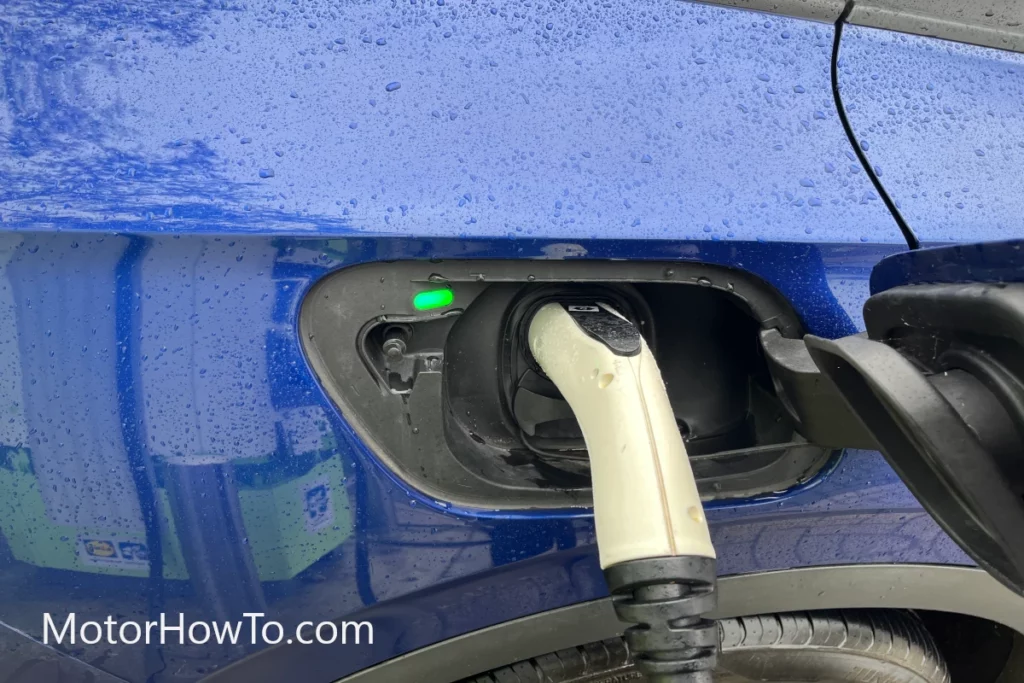The leading cause of an unpleasant smell from your car’s heater is debris and dust caught in the filter.
How often should you service your car’s climate system? What do different smells indicate?
Keep reading to learn more!
Why Does My Car Smell When the Heater is On
The most likely cause of your car heater producing a bad smell is dirt, mold, or other debris. This debris can become lodged in the filters and cause the airflow to smell putrid or unpleasant. The best way to fix this issue is to have a mechanic replace the filters or replace them yourself.
- Why Does My Car Smell When the Heater is On
- How Can You Diagnose the Cause of Bad Smells in Your Car?
- Do You Need To Service Your Car's Climate Control To Eliminate Bad Smells?
- What Different Types Of Smells Can You Expect When The Heater Is On?
- How Can You Prevent Smell Build-Up In The Future?
- Conclusion
- Sources
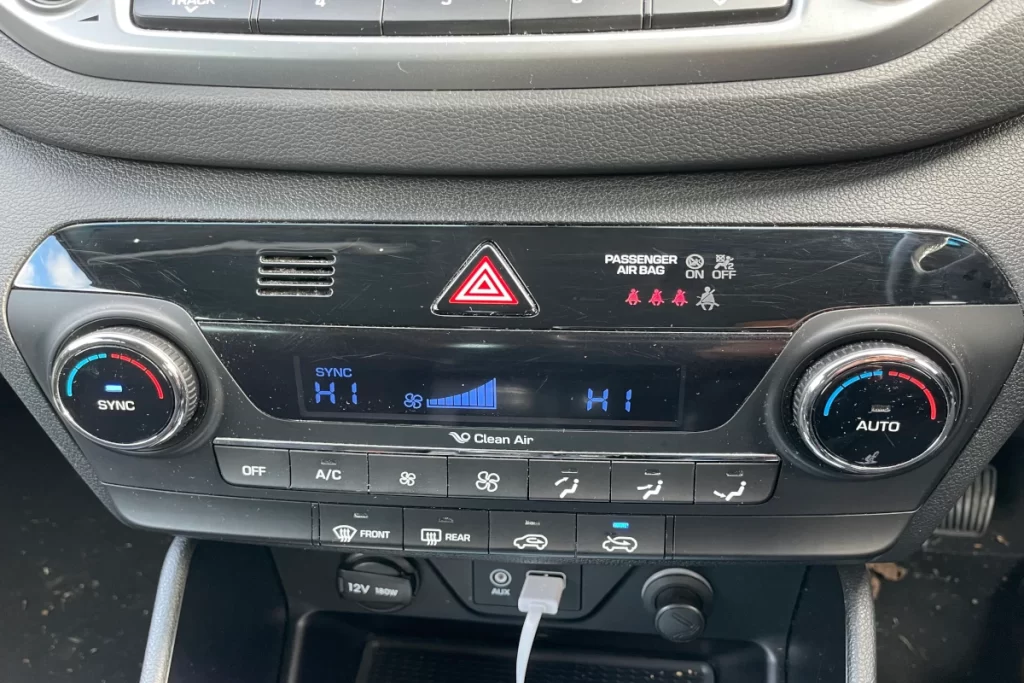
Heater filters are also known as cabin air filters. This might sound like something you’re used to hearing about on an airplane and not inside a car.
However, these filters serve a similar function in cars as they do in planes and are equally important.
The cabin air filters are usually located in the ductwork of the car someplace near the windshield under the hood. This ductwork is responsible for pulling outside air into the vehicle.
However, the air will be heavily contaminated by the road, engine, and other particles without the filters.
This makes them an essential part of your safety and pleasure.
Generally, most cars have what’s known as a standard car air filter. These filters are usually made from paper or thick cardboard-like material.
These filters filter most pollutants, including dirt, dust, and bugs.
However, most reports give them a 98% efficiency rating in air purification. They also require maintenance every 15,000-20,000 miles (or more in particularly dusty regions).
There are two main alternatives to a standard car air filter. These include:
- Performance air filters
- HEPA air filter
Air filters don’t just protect you and other riders; they also protect the engine.
A performance filter is designed to maximize airflow to the engine while guaranteeing the air is clean. Performance air filters mainly focus on enhancing the performance of the vehicle’s engine.
These air filters are a favorite of sports car enthusiasts. They’re primarily known for increasing the engine’s power and improving overall speed and fuel consumption.
Cotton performance filters don’t require as much maintenance as standard filters. These filters can be cleaned manually, unlike standard filters. They should be cleaned every 50,000 miles, which is significantly less than 15,000 miles for standard filters.
HEPA filters are the crowning achievement for air filtration. HEPA filters are designed to filter up to 99.97% of all airborne contaminants and debris.
These filters are ideal for those who want the best air filtration technology. HEPA filters are an effective way to prevent bacteria flow, such as COVID-19 and the standard flu. Although they’re significantly more expensive than a standard filter, the perks make them highly desirable.
Related:
- Is Car Heater Bad For My Health? (8 Preventive Measures)
- Why Is My Car Blowing Hot Air Out When The Heater Is Off? (Solved)
- Why is My Car Heater Blower Squealing and Screeching? (Solved)
How Can You Diagnose the Cause of Bad Smells in Your Car?
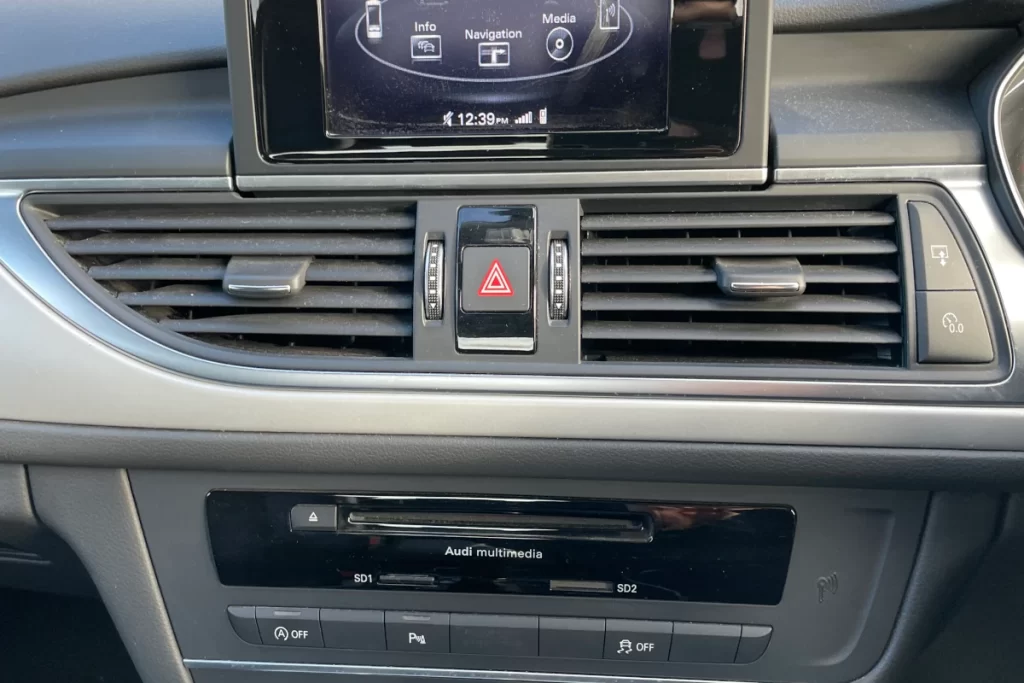
Your nose will be the best tool for discovering the cause of your car’s bad smell. Identifying where the scent comes from is essential to determine if it’s your car filter or something else. Explore the inside of your car for any signs of decay or rot.
One of the best ways to diagnose the cause of your car’s smell is to check out your vehicle. Clean your car and vacuum the seats to ensure they are hiding anything that could be rotting.
Musty smells could be coming from your filter. However, it could also come from the car’s seats, which might require thorough cleaning.
You can clean your car seats with water, vinegar, and baking soda to kill bacteria and eliminate foul odors. Or, for a thorough cleaning, first vacuum or brush your seats and then steam clean them. This should leave a fresh scent behind.
After cleaning the inside of your car, try turning on the A/C or heater. If you still smell a putrid or unpleasant smell, the scent wasn’t coming from inside your car. It’s coming either from the car’s engine or the car’s air filter.
Cars have two primary filters which could impact your car’s smell:
- Air filter
- Engine filter
The engine filter cleans fuel and air that enters the engine. If this filter is old or dirty, it could create an unpleasant smell.
Similarly, the car’s air filter can produce unpleasant smells if it has debris and dust buildup. These filters aren’t as effective when they’re dirty and thus might allow more contamination into the cabin.
Do You Need To Service Your Car’s Climate Control To Eliminate Bad Smells?
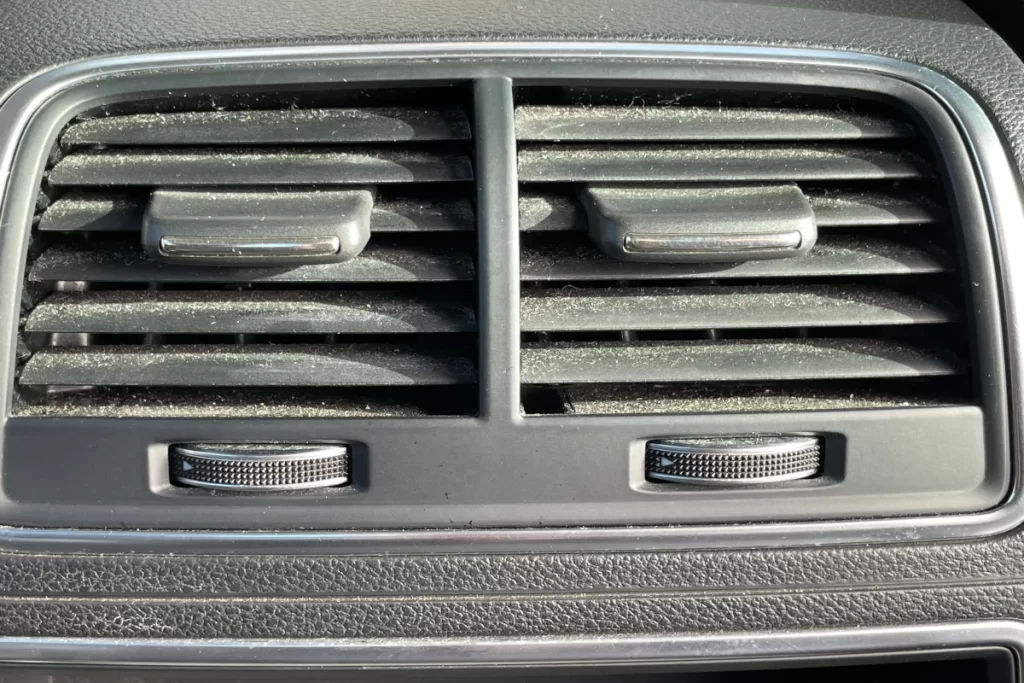
Your climate control should be serviced if you smell gasoline or other chemical scents. These smells could indicate a leak, which means you could breathe highly toxic fumes. However, if the odors are unpleasant or funky, you can address the issue yourself.
Before calling your mechanic, you must first figure out what type of smell you’re smelling. We will dive into these scents in detail below, but here we’ll discuss when to call your mechanic.
If your air filter is dirty, you can easily change your filter yourself. To change an air filter, you should follow these steps:
- Locate the air filter box
- Remove the air filter
- Determine if you should replace the filter or clean it
- Replace filter (or return after cleaning)
- Cover box
- Check the car to see if the scent went away (it might take a few minutes)
Some filters can be cleaned and returned to the filter box. Performance filters made of cotton are the easiest to clean. However, you can clean a standard filter, but don’t use water. Your best bet is to clean it with vinegar spray and a dry rag.
Standard filters are cheap, and many find it’s easier just to replace them rather than clean them.
However, if you notice a hole or crack in the exhaust hose or coolant system, don’t attempt your own repairs. These are serious repairs and should be done by a professional to prevent dangerous fumes.
What Different Types Of Smells Can You Expect When The Heater Is On?
You can expect an odd smell if it has been months since you used your heater or A/C. This could be moisture buildup or simply decaying particles stuck in the filter. However, sweet smells, gas smells, and oil smells could indicate something serious.
1. Burning rubber
Smelling burning rubber can be pretty serious, depending upon the cause.
Smelling burning rubber could be caused by:
- Slipped or broken belt
- Overheated tires
- Overheated brakes
- Burning debris inside the filter
You should take the smell of burning rubber seriously. Although it could simply be a dirty filter, it signifies that your car has fundamental issues.
Additionally, a burning scent from the filter could indicate debris is trapped inside and disrupting the engine. You should check the air filter right away. If a dirty filter does not cause it, then you should get your car checked out.
2. Burning plastic
Smelling burning plastic could indicate something is trapped inside or touching your exhaust pipe.
However, it’s more likely to be a clog or debris inside your car’s heater.
Something may have become lodged in the heater while the car was idle. When you switch on the heater, the hot air blowing over the debris will create a burning scent.
Or, if the air filter or heater is full of dust, it can create a burning plastic scent.
3. Oil
Smelling burning oil indicates an issue with your car’s engine rather than the heater. The most likely cause is a leak in the engine’s oil supply, which falls onto the hot engine or the filter.
Hot air blowing over the oil will cause a burning scent. The heater will pull the burning scent into the car’s cabin as the oil heats up.
However, if you’re driving uphill a lot, this can create an oil-burning scent that might not be serious. It is always safer to check, though.
Oil can get in the exhaust pipe, which isn’t uncommon when driving uphill. This can cause a slight oil-burning scent which isn’t serious.
Although, if you notice oil pooling under your parked car, your engine might have a serious leak. Leaking oil can damage your car’s engine, climate control system, and other parts.
4. Antifreeze
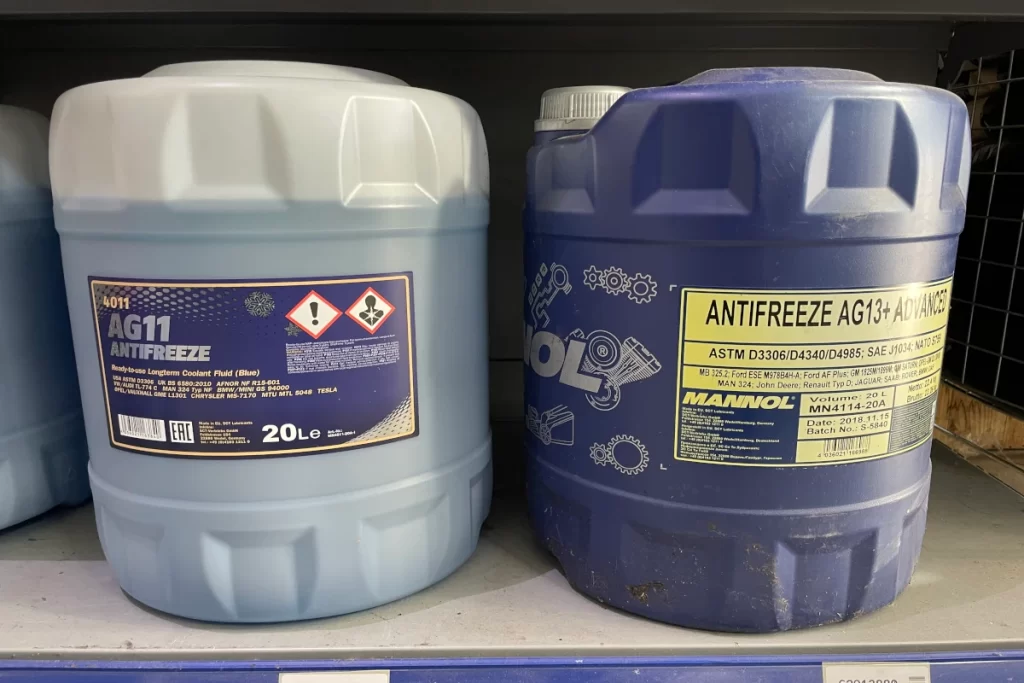
Antifreeze smells like something sweet trapped inside your heater. Many people describe it as similar to maple syrup or candy.
The best way to check to confirm it’s your antifreeze is to check under your hood. If the antifreeze seems lower than you suspect, it could indicate your fluid is leaking. Or, if your car appears to be overheating a lot, it could mean an issue with your coolant system.
Antifreeze is very toxic; if your heater is drawing it inside your cabin, it can harm you. You should be careful and take your car to be fixed right away.
5. Exhaust
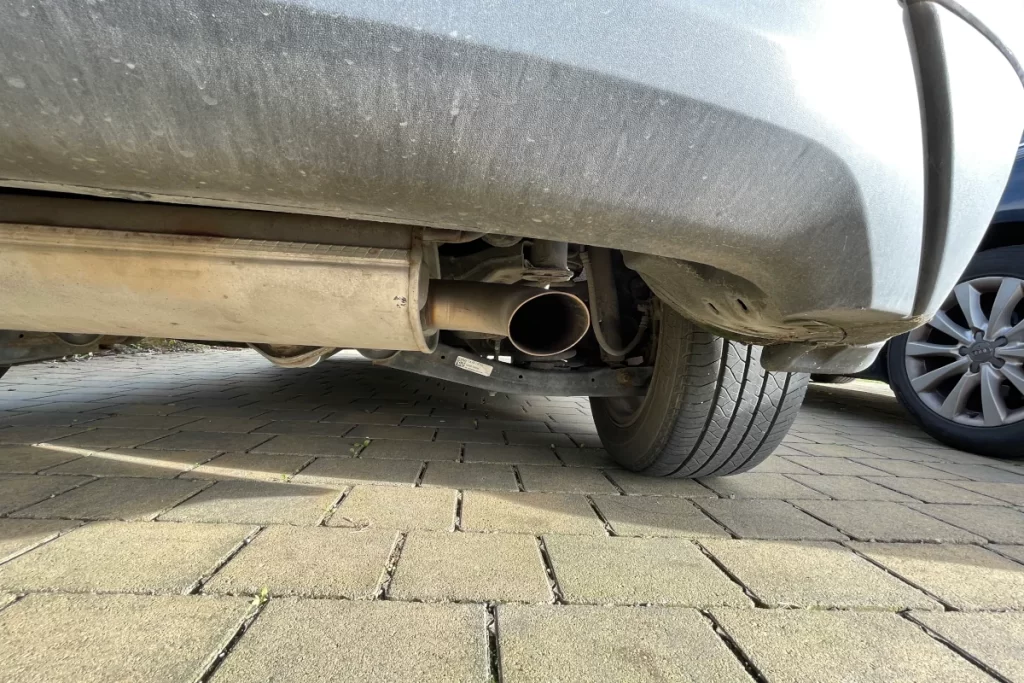
Smelling exhaust in your car heater could be harmless if it’s been a while since you used it. The heater core may have a buildup that needs to be burned off.
However, it could also be an issue with your car’s exhaust system. This is a serious issue that should be addressed immediately.
This could indicate something is lodged inside your exhaust system or blocking it from flowing. This can lead to this toxic air entering your car cabin, which could cause carbon monoxide poisoning.
6. Gas
Smelling gasoline when using your heater is most likely caused by exposure to gas fumes. This can occur if you recently visited a gas station or are following a bad-smelling car.
However, it might indicate that you’re gas cap is bad or leaking. This isn’t as serious as some issues we discussed, but we recommend you visit a mechanic as soon as possible.
7. Rotten egg
Rotten egg smells from your heater indicate gasoline has leaked into the catalytic converter. This part of the car takes exhaust and converts it into a less harmful pollutant.
This is accomplished by adding chemicals to the converter that react with the car fumes. These chemicals react with the exhaust and expel it as a less harmful gas.
However, if gasoline leaks inside this converter, it can break down and leave a sulfuric scent. When the heater picks up this scent, it can resemble rotten eggs.
How Can You Prevent Smell Build-Up In The Future?
Properly cleaning and maintaining your car’s filter is important to keep your car smelling good. You should maintain your car’s climate control system at least once per year. You can also enhance your car’s air quality by adding an antibacterial cleaning agent to the filter.
Higher-quality air filters last much longer than standard filters. If you have difficulty regularly cleaning your filters, you should purchase a higher-quality filter that lasts longer.
You should disinfect your car’s filter and A/C unit every six months for the best results. This includes the A/C’s drain hose and ventilation system.
Finally, add an anti-bacterial spray to your heater. You add these specialized sprays to your system and give them time to pass through to the drain hose to clean them out. This will also allow the spray time to break down bacteria and mold spores.
Conclusion
Smelling a foul odor from your heater could be severe or perfectly harmless.
Diagnosing the cause is vital to protect yourself and your car.
If you’re not sure, it’s safest to take it to a mechanic to check it out.
The cause could be simple mold spores or dirt, but it might be chemical fumes.
Sources
Cars: What’s a Cabin Air Filter and When Should You Replace It?
AAA: Changing The Cabin Air Filter In Your Car
Fast Car: Performance Car Air Filter Test
DIY Car Service Parts: The Difference Between Standard and Performance Air Filters
Robin’s Nissan: Easily clean your car seats with these great tips!
Tire Plus: AIR, OIL, TRANSMISSION, FUEL & CABIN: GET TO KNOW YOUR VEHICLE’S FILTERS
Champion Auto Parts: HOW TO INSTALL AN ENGINE AIR FILTER
GEICO: What’s That Smell Coming From My Car’s Engine?
Doc Motor Works: Why Does My Car Heater Smell Like Something Is Burning?
Palmer Racine: Palmen Dodge Chrysler Jeep of Racine
O’Leary’s Automotive: Is a little oil dripping from my vehicle a big deal?
Bo Beukmanford: WHAT TO DO WHEN YOU SMELL ANTIFREEZE: YOU MAY HAVE A LEAK
Community Cartalk: Exhaust fumes smell when heater is on
Mayo Clinic: Carbon monoxide poisoning
Classic Toyota: 3 Reasons You Might Smell Gasoline When You’re Driving
HB Auto and AC: WHY DOES MY CAR SMELL LIKE ROTTEN EGGS?
Cars: What’s a Catalytic Converter and Why Do People Steal Them?

